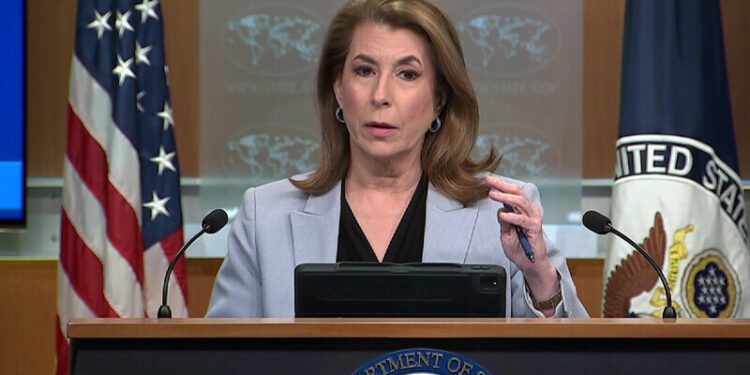The United States has reiterated that while President Donald Trump is open to offering mediation on the long-standing Kashmir dispute between India and Pakistan, he cannot and will not force either side to accept such an offer. This clarification was issued by U.S. State Department spokesperson Tammy Bruce, reflecting Washington’s nuanced stance on one of South Asia’s most complex and volatile geopolitical issues.
This statement comes amid growing attention to President Trump’s repeated offers to help de-escalate tensions between the nuclear-armed neighbors. Despite these offers, India has consistently rejected third-party mediation, maintaining that the Kashmir issue is a bilateral matter between New Delhi and Islamabad.
U.S. Mediation Offer: Voluntary, Not Coercive
During a recent press briefing, Tammy Bruce was asked why India has been persistently turning down President Trump’s mediation offer on Kashmir. In response, she emphasized that:
“As President Trump has said, everyone has the right to determine their own future. He offers help, and it depends on the person to whom this offer is being made whether they accept it or not.”
This response made it clear that U.S. mediation in Kashmir is not being imposed but rather offered as a potential pathway to peace. The spokesperson’s comment underscores Washington’s understanding of the diplomatic sensitivities involved in the Kashmir conflict, especially in light of India’s firm stance on sovereignty and non-interference.
The Context: Rising Tensions and Trump’s Kashmir Comments
President Trump has, on multiple occasions, offered to mediate the Kashmir dispute, most notably during his meetings with Pakistani leaders. He previously claimed that Indian Prime Minister Narendra Modi had also sought U.S. assistance, a claim that was immediately denied by New Delhi, which insisted that no such request had been made.
Trump has referred to Kashmir as a “very complicated” and “long-standing” issue, even describing it as a “thousand-year-old conflict.” These statements were made in the backdrop of heightened tensions between India and Pakistan, particularly following the aerial dogfight between the two nations in February after the Pulwama terror attack, which resulted in the deaths of over 40 Indian paramilitary personnel.
This period marked one of the most dangerous flashpoints in recent South Asian history, with both countries carrying out airstrikes on each other’s territory, escalating fears of a potential full-scale war between two nuclear powers.
U.S. Policy on Kashmir: Respecting Sovereignty While Promoting Peace
The State Department’s remarks reflect the U.S.’s balancing act: trying to encourage peaceful dialogue and de-escalation without interfering in sovereign matters. Tammy Bruce reaffirmed this by stating:
“I will not comment on the nature of any other country’s decisions. That is their own matter.”
This statement reflects Washington’s recognition of the limitations of its influence, particularly when one of the parties—India—firmly rejects outside involvement in matters it considers internal.
India’s Consistent Position: Kashmir Is a Bilateral Issue
India has repeatedly maintained that Kashmir is a bilateral issue to be resolved directly with Pakistan, in line with the Shimla Agreement (1972) and the Lahore Declaration (1999). These diplomatic agreements clearly state that any resolution must be achieved bilaterally, without third-party intervention.
This stance has remained consistent across successive Indian governments. New Delhi views any external involvement—particularly from Western powers—as a challenge to its sovereignty, especially since it considers the region of Jammu and Kashmir an integral part of India.
In contrast, Pakistan has frequently sought international mediation, including by the United Nations and the United States, citing alleged human rights violations and the need for the Kashmiri people’s right to self-determination under UN Security Council Resolutions.
A U.S. President with a Peace-Focused Agenda?
Tammy Bruce also praised President Trump’s broader foreign policy approach, characterizing him as a leader focused on global peace initiatives. She remarked:
“We are living in an interesting and important time, where we have a leader who can make a difference, and he is also sincere about making that difference. He could have dedicated his presidency to any other cause, but he embraced the goal of peace and making America great again.”
Bruce emphasized that Trump’s intentions are rooted in a desire for global stability, not in applying pressure or violating national sovereignty. She concluded by saying:
“I think we are all grateful that we have a president who wants to help.”
Analysts: Mediation Offers Symbolic but Unlikely to Be Accepted
International analysts suggest that President Trump’s mediation proposals are more symbolic than practical, particularly given India’s clear rejection of third-party involvement. While Pakistan has welcomed such offers, any mediation requires consent from both parties, which remains absent.
Experts also point out that these offers may be motivated by diplomatic optics, especially when engaging with allies like Pakistan, where Washington has strategic interests in counterterrorism, Afghanistan’s security transition, and regional stability.
U.S. Role in South Asian Stability: An Ongoing Challenge
The U.S. continues to walk a diplomatic tightrope in South Asia. On one hand, it is a major strategic partner of India, particularly in defense and trade. On the other, it relies on Pakistan for intelligence cooperation and regional counterterrorism efforts.
The Kashmir conflict complicates this triangular relationship, especially during periods of military escalation or diplomatic breakdowns between New Delhi and Islamabad.
Washington’s emphasis has generally been on reducing tensions, encouraging dialogue, and preventing conflict from spiraling into war. The recent statements by the State Department reflect this cautious and non-intrusive approach, keeping peace diplomacy open without offending India’s sensitivities.
Looking Ahead: Will Mediation Ever Be Possible?
Given the deep-rooted historical, territorial, and political dimensions of the Kashmir dispute, third-party mediation remains highly unlikely in the foreseeable future, unless both India and Pakistan agree to it—a scenario that currently seems remote.
Nevertheless, the U.S. may continue to play an indirect role, particularly by:
- Encouraging backchannel diplomacy
- Promoting military de-escalation
- Supporting humanitarian efforts and confidence-building measures
- Engaging with both governments at high diplomatic levels
Conclusion: Mediation Possible Only with Consent
The U.S. State Department’s statement is a clear message that while President Trump is willing to help resolve the Kashmir dispute, he cannot impose his mediation on either party. The responsibility to engage in dialogue lies with India and Pakistan themselves.
Tammy Bruce’s comments confirm that the U.S. respects sovereignty, diplomacy, and international norms, while also continuing its efforts to reduce tensions in South Asia. Whether or not the Kashmir issue moves toward resolution in the near future, the role of global powers will remain advisory and supportive—not coercive.

























